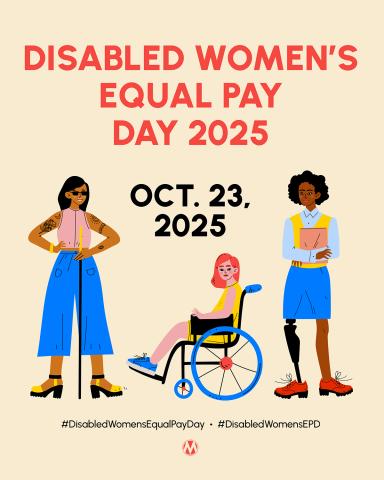
Today we stand with women with disabilities demanding fair pay.
Some disabilities are visible. Others are not.
Disability is diverse. It includes mobility, physical, sensory, and developmental differences, as well as chronic illness, mental health conditions, and neurodivergence.
But whether visible or invisible, women with disabilities are working, parenting, caregiving, and contributing every single day—often in a world that still refuses to acknowledge or fairly value their work.
Today is Disabled Women’s Equal Pay Day, and it is a reminder that women with disabilities are still being paid less, valued less, and too often left out of conversations about pay and wage equity!
Today, we are focused on breaking barriers for people with disabilities.
These pay disparities are severe. In fact, for every dollar paid to a man without a disability, a woman with a disability working full-time, part-time, or part-year earns just 56 cents. [1] What a lot of people don’t recognize is that sometimes having a disability forces people into part-time work, not by choice, but because many jobs are not equipped to support and accommodate all people. Because our systems still fail to recognize and include women with disabilities, they are too often pushed into low-wage jobs with limited mobility, career growth or professional development opportunities.
Yet, even when women with disabilities are working full-time, year-round, they are only paid 68 cents for every dollar earned by a man without a disability working the same hours. And this number decreases when you disaggregate the data, with women of color with a disability making even less. [2]
Women with disabilities are doing the same work, showing up just as much, and still earning less. NOT okay! The bottom line is that discrimination and exclusion are keeping too many women with disabilities away from earning fair pay, making it harder for them to build wealth, and forge a pathway towards economic security and a financial safety net for themselves and their families.
There’s a lot at stake in this government shutdown. People with disabilities, especially women, are among those most affected by what Trump and Republican leaders are proposing for health care. Cuts to health coverage, employment programs, and essential services threaten the supports that make independent and community living possible. Affordable health care, medications, therapies, and community resources aren’t luxuries—they’re fundamental to equality, opportunity, and full participation in society.
Women with disabilities have been on the front lines of the fight for equity, disability rights, and dignity for generations—and we’re not stopping now. [3] We will NOT go back! We will not let the current Administration leave people with disabilities behind. Congress must protect health care, defend employment programs and invest in resources that allow women with disabilities to work, be paid fairly, and care for their families. Anything less is unacceptable.
Thank you,
Diarra, Ruth, Nate, Kristin, and the whole MomsRising.org & MamásConPoder Team
P.S. - Have you or someone you love faced workplace discrimination or unfair pay? Sharing personal stories with our lawmakers is a powerful tool in the fight against discriminatory wage gaps! Tell us about your experience!
References:
[1] “Disabled Women’s Equal Pay Day”
[2] “Disabled Women Deserve Equal Pay and More”
[3] “The Trump Administration’s War on Disability”
Image Description:
A beige background with bold red and black text that reads:
“Disabled Women’s Equal Pay Day 2025 – Oct. 23, 2025.”
Below the text are three illustrated women.
On the left, a woman with medium skin tone and dark hair stands confidently with one hand on her hip and the other holding a white cane.
In the center, a woman with light skin and pink hair sits in a wheelchair, looking forward with a calm expression.
On the right, a woman with dark skin and curly hair stands holding a folder; she has a prosthetic leg.
The women are drawn in bold, bright colors (blue, yellow, pink, and red) symbolizing empowerment and solidarity.
At the bottom, hashtags read:
#DisabledWomensEqualPayDay #DisabledWomensEPD


The views and opinions expressed in this post are those of the author(s) and do not necessarily reflect those of MomsRising.org.
MomsRising.org strongly encourages our readers to post comments in response to blog posts. We value diversity of opinions and perspectives. Our goals for this space are to be educational, thought-provoking, and respectful. So we actively moderate comments and we reserve the right to edit or remove comments that undermine these goals. Thanks!